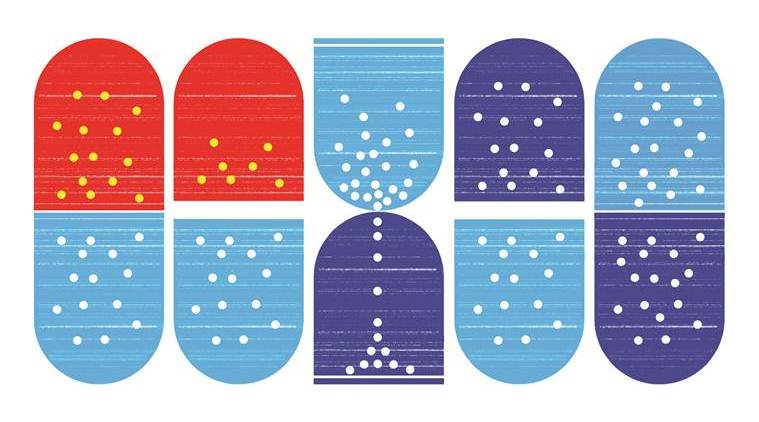
[ad_1]
 An estimated 70 per cent of API requirements of India’s pharmaceutical industry are sourced from China. (Illustration by C R Sasikumar)
An estimated 70 per cent of API requirements of India’s pharmaceutical industry are sourced from China. (Illustration by C R Sasikumar)
There is a growing clamour in India for boycotting trade with China amidst recent political tensions between the two countries. Such a possible move, however, is a major cause of concern for India’s pharmaceutical industry as well as for people in India, and globally, who rely on the country’s world-renowned supply of medicines.
Trade boycotts or bans are especially costly when production is organised through global supply chains, as is the case with the pharmaceutical industry. Although India is the third largest producer of finished drugs in the world, it relies significantly on China for supplies of active pharmaceutical ingredients (APIs), the key components in making medicines. An estimated 70 per cent of API requirements of India’s pharmaceutical industry are sourced from China. For some drugs, such as paracetamol and ibuprofen, this dependence is almost 100 per cent. This import reliance has been fuelled by environmental controls in India and competition with China, which has higher volumes of production and lower costs. Given this, restricting or banning the import of APIs would cause significant disruption to the Indian pharmaceutical industry which had $40 billion in revenues in 2018-19, according to Pharmexcil.
Such a prospect is especially of concern to potential patients. A severe contraction of Indian pharmaceutical production and its almost $20 billion worth of annual exports, would affect access to medicines both in India and globally. The impacts would be especially high in low and middle-income countries which have become increasingly dependent on affordable medicines supplied by India. In many African countries, in fact, India supplies almost 50 per cent of the medicines in value terms and even higher percentages in terms of volume.
Some in India have invoked swadeshi to justify a trade boycott of China, pointing to the earlier transformative shift of India’s pharmaceuticals from a foreign-dominated industry to one controlled by Indian firms. True, the market share of foreign-owned multinationals in India fell dramatically from 80-90 per cent in 1970 to 50 per cent by the early 1980s, and down to 23 per cent today. Also, the prices of medicines in India fell from being amongst the highest in the world to amongst the lowest.
But the domestically-owned pharmaceutical industry did not take-off through an abrupt decoupling from foreign multinationals, or a complete boycott or ban on imports. The 1970 Indian Patent Act, which removed product patent protection in pharmaceuticals, is widely lauded for facilitating the growth of India’s industry. India also benefited from the 1973 Foreign Exchange Regulation Act (FERA) and the subsequent New Drug Policy (1978), which restricted — but did not ban — the activities of foreign multinationals in the country. Thus, a series of policy initiatives succeeded in tilting the balance in favour of Indian-owned firms.
During the initial phase of the COVID-19 pandemic, many feared that China’s supply of APIs to India would decline due to China’s lockdown. Although those fears have not been realised, the Indian government has moved to promote more API production in the country. In March, the government announced Rs 3,000 crore to develop three bulk drug parks, as well as Rs 6,940 crore to manufacturers of 53 bulk drugs over the next eight years. Planning ahead towards greater domestic production of APIs, as well as reduced dependence on China, is an understandable and sensible policy objective. Despite relative decline in recent decades, India has a stronger starting point than most countries given the continued presence of some API production capabilities. Indian firms have capacities, for instance, to produce COVID-19 treatments, including Remdesivir.
Other countries are also seeking to reduce their reliance on China for APIs, most notably the US. It has longstanding concerns over the health security implications of such reliance, including the possibility of China restricting its export of medicines during a crisis. This May, the Trump Administration announced a $354 million contract to a new company, Phlow Corp. for manufacturing generic medicines and pharmaceutical ingredients. Hence the US is also seeking greater self-reliance, but this is without immediate boycott. In fact, even in the context of the US-China trade war, the US has excluded pharmaceuticals and some related products from tariff increases.
Reducing dependence on China will not be easy to achieve. In India, any decoupling from China must be strategic, with significant policy support, and it will take time for a paced indigenisation. An ad hoc or reactive decoupling could disrupt the production of a wide range of medicines which currently require ingredients from China. Dexamethasone, a steroid which a UK study recently found significantly improves survival rates from COVID-19, is one notable example. Others include painkillers, such as paracetamol and ibuprofen, as well as antibiotics, such as penicillin.
Thus, in the short run, boycotts or bans would be counter-productive for Indian industry, while also affecting access to much needed medicines to India’s citizens and beyond. In the long run, however, reducing dependence on China would be strategically prudent.
The writer is senior lecturer, Global Development Institute, University of Manchester.

For all the latest Opinion News, download Indian Express App.
© The Indian Express (P) Ltd
[ad_2]
Source link